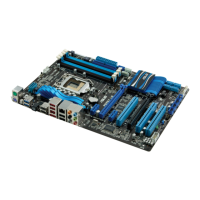1-27Chapter 1: Product introduction
10. USB 2.0 ports 1 and 2. These two 4-pin Universal Serial Bus (USB) ports are
available for connecting USB 2.0 devices.
11. eSATA port.
This port connects to an external Serial ATA hard disk drive.
12. IEEE 1394a port.
This 6-pin IEEE 1394a port provides high-speed connectivity for
audio/video devices, storage peripherals, or portable devices.
13. USB 2.0 ports 5 and 6. These two 4-pin Universal Serial Bus (USB) ports are
available for connecting USB 2.0 devices.
14. Optical S/PDIF Out port. This port connects an external audio output device via an
optical S/PDIF cable.
15. USB 3.0 ports 1 and 2. These two 9-pin Universal Serial Bus (USB) ports are
available for connecting USB 3.0 devices.
• DO NOT connect a keyboard / mouse to any USB 3.0 port when installing Windows
®
operating system.
• Due to USB 3.0 controller limitation, USB 3.0 devices can only be used under Windows
®
OS environment and after the USB 3.0 driver installation.
• USB 3.0 devices can only be used as data storage only.
• We strongly recommend that you connect USB 3.0 devices to USB 3.0 ports for faster
and better performance for your USB 3.0 devices.
16. PS/2 Keyboard port (purple). This port is for a PS/2 keyboard.
Refer to the audio conguration table below for the function of the audio ports in the 2, 4, 6,
or 8-channel conguration.
Audio 2, 4, 6, or 8-channel conguration
Port
Headset
2-channel
4-channel 6-channel 8-channel
Light Blue Line In Line In Line In Line In
Lime Line Out Front Speaker Out Front Speaker Out Front Speaker Out
Pink Mic In Mic In Mic In Mic In
Orange – – Center/Subwoofer Center/Subwoofer
Black – Rear Speaker Out Rear Speaker Out Rear Speaker Out
Gray – – – Side Speaker Out

